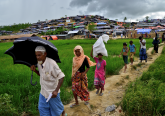On the 12 December, 2019 the International Court of Justice (ICJ) concluded its public hearings on the request for the indication of provisional measures submitted by the Republic of The Gambia in the case of the application of the Convention on the Prevention and Punishment of the Crime of Genocide (The Gambia v. Myanmar). The case is the first of three cases against Myanmar in a move to hold the country accountable for the atrocities committed against the Rohingya minority in Rakhine State since August 2017, which drove 730.000 into neighbouring Bangladesh. The International Criminal Court launched an investigation into the persecution of the Rohingya on 14 November while a separate case under the principle of universal jurisdiction was filed in Argentina.
For the outcome of the case, the question whether Myanmar acted with genocidal intent is likely going to be crucial. Myanmar argued that “under the circumstances, genocidal intent cannot be the only hypothesis.” Indeed, one of the lawyers representing Myanmar argued that forced displacement might be a more likely motivation for the actions of Myanmar’s armed forces (Tatmadaw). Notably, forced displacement does not necessarily constitute an act of genocide in and of itself.
While the ICJ has no mechanism to enforce its rulings, the process is already impacting Myanmar significantly in several ways. Firstly, debates around sanctions are back on the table, less than a decade after most sanctions on Myanmar were lifted. The US has already strengthened sanctions targeted at a handful of senior Tatmadaw commanders, but broader sanctions are becoming ever-more likely. It is not at all clear whether a new sanction regime would help alleviate the plight of the Rohingya minority and improve the chances of holding the Tatmadaw accountable for the crimes they committed. Nonetheless, in light of recent events, the European Union is seemingly reconsidering a proposal to remove Myanmar’s status in the Generalised System of Preferences (GSP), which removes import duties from products that come from less-developed countries. Losing the status would be detrimental to the country’s garment sector, possibly resulting in the loss of up to 400.000 jobs.
Secondly, less than a year before the next general elections in 2020, the ICJ case has strengthened the support for the ruling National League of Democracy (NLD) and its leader Aung San Suu Kyi in Myanmar. It is likely that Aung San Suu Kyi’s decision to lead the delegation to the ICJ herself was motivated by a political calculation to increase support rather than by close ties with the military (as other media reports have suggested). The NLD has been busy staging rallies in support of the party’s leader and many citizens have taken to the streets and social media to declare that they “stand with Mother Suu.” The national support for Aung San Suu Kyi’s appearance at the ICJ has drawn ire and incomprehension from international observers. Many media outlets have argued that it is her role as a “protector of the generals” that has consolidated the popularity of her and her party.
However, this explanation is too simplistic. Yes, Aung San Suu Kyi travelled to The Hague to defend the actions of the Tatmadaw but that is neither necessarily improving the relationship between her civilian government and the armed forces, nor is her defence of the Tatmadaw the sole reason for her increased popularity. Many people who voiced their support for Aung San Suu Kyi also pointed out that they are angry with the armed forces because their actions put her into the situation of having to “defend the country.”
The support for Aung San Suu Kyi stems from the dominant narrative in Myanmar that depicts the case at the ICJ as a case of “Myanmar vs. the World”. Most people in Myanmar feel that the charge of genocide is unjustified because they regard the Tatmadaw’s actions an adequate response to the attacks on police posts by the Arakan Rohinyga Salvation Army(ARSA), a comparatively small insurgent group. Indeed, many accuse Western countries of double standards, arguing that their tough stance on terrorism at home does not translate to their view of the conflict in Myanmar. This perception is also influenced by strong anti-Muslim and anti-Rohingya sentiment in Myanmar, which not only prevails but has become stronger through the polarisation of the matter.
While Aung San Suu Kyi and her party were condemned in the West for failing to speak up for the Rohingya, in Myanmar her stance was considered not tough enough. Indeed, media outlets supporting the Tatmadaw and the military-backed Unions Solidarity and Peace Party (USDP) would print pictures of her visiting Muslim businesses in an effort to lessen her popularity with voters. Now, for the first time, the NLD has been able to gain political capital from the atrocities in Rakhine State by portraying the party’s leader as the “defender of Myanmar” at staged rallies and in the media. Rather than “cosying up to the generals” the move to make Myanmar’s case at the ICJ has been motivated by a wish to change voters’ perception of the NLD’s stance on the Rohingya affair and to strengthen support for the NLD prior to the 2020 general elections.
It might be reasonable to expect that the Tatmadaw are pleased that someone else moved into the spotlight of the Rohingya crisis, but it is not clear whether this is actually the case. On the contrary, the armed forces might be displeased by Aung San Suu Kyi’s popularity surge. Predictions for lower support for her party in the next general elections, which surfaced in light of her government’s performance falling behind the expectations of voters, might now have to be reconsidered. A strong election result would also give the NLD more leverage over constitutional reform that would limit the role of the military.
In any case, the situation that is unfolding in Myanmar – marked by economic and political alienation from the West and increased support for the government’s way of dealing with the Rohingya crisis – is not one that is likely going to aid the improvement of the condition of those Rohingya remaining in Myanmar or those living in camps in Bangladesh. The ICJ case is rightly being described as a land-mark case and a ruling in favour of The Gambia will send a vital signal to Myanmar and the international community. More importantly, it would provide a symbolic victory for those that have suffered from the atrocities at the hands of the Tatmadaw. But it would be misleading to assume that Myanmar would feel compelled to follow through with the remedy provisions requested. Irrespective of the outcome of the case, the international community needs to increase its practical support to the Rohingya and improve its cooperation with Bangladesh – politically but also through substantially improved humanitarian support.




